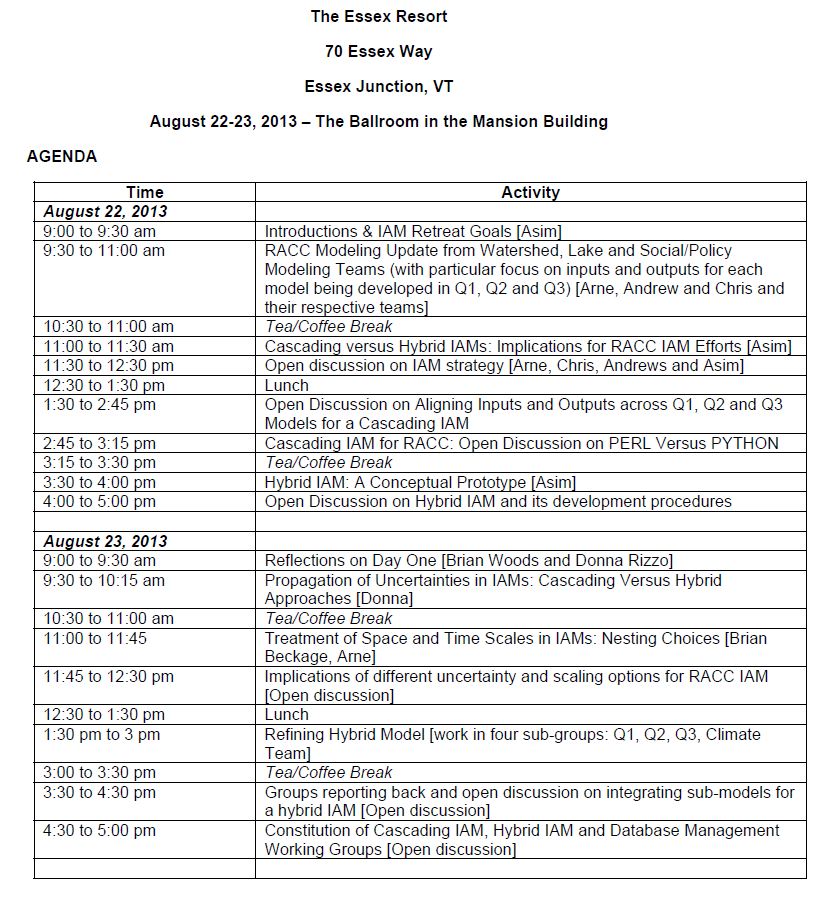A two-day RACC Integrated Assessment Modeling (IAM) retreat took place at the Essex Resort on August 22-23, 2013. Over 20 RACC researchers participated in the retreat to discuss a variety of issues pertaining to the development of IAM.
Dr. Asim Zia, IAM Science Leader, facilitated and led the discussion on both days. On the first day of the retreat, Dr. Judith Van Houten, State Director, VT EPSCoR, laid out the scientific and policy rationale for the RACC team to work collaboratively on the IAM development. Later, all three teams on the RACC project – lake ecology team (Q1), watershed modeling team (Q2) and social/policy modeling team (Q3) presented the current state of their respective data collection and modeling efforts. In particular, the three research teams were requested to provide detailed information about the inputs and outputs for the specific models that are being developed by each team.
After the presentations from the three research teams, the RACC team as a whole discussed a variety of conceptual, scientific and technical issues with respect to the development of IAM that requires integration of lake, watershed and social/policy models. Dr. Patrick Clemins, VT EPSCoR Cyber Specialist, presented pros and cons of using PERL versus Python as a programming platform for IAM.
The second day of the retreat was devoted to discussing issues of uncertainty propagation in designing integrated models. Accommodation of multi-scale processes and integration of nested scales in the IAM were also extensively discussed on the second day of the retreat. Dr. Brian Woods, Coordinator, Vermont Climate Cabinet, from the Agency of Natural Resources reflected upon the plan of action for IAM development.
Three working groups were formed at the end of the retreat that will continue to work on technical and data management aspects of the IAM development. The next IAM retreat will take place in the spring of 2014 to review the progress against the project milestones.
A full agenda may be found below. For more information, please contact the VT EPSCoR office at epscor@uvm.edu

 Funding provided by NSF EPS#1101317
Funding provided by NSF EPS#1101317

Dr. Asim Zia, IAM Science Leader, facilitated and led the discussion on both days. On the first day of the retreat, Dr. Judith Van Houten, State Director, VT EPSCoR, laid out the scientific and policy rationale for the RACC team to work collaboratively on the IAM development. Later, all three teams on the RACC project – lake ecology team (Q1), watershed modeling team (Q2) and social/policy modeling team (Q3) presented the current state of their respective data collection and modeling efforts. In particular, the three research teams were requested to provide detailed information about the inputs and outputs for the specific models that are being developed by each team.
After the presentations from the three research teams, the RACC team as a whole discussed a variety of conceptual, scientific and technical issues with respect to the development of IAM that requires integration of lake, watershed and social/policy models. Dr. Patrick Clemins, VT EPSCoR Cyber Specialist, presented pros and cons of using PERL versus Python as a programming platform for IAM.
The second day of the retreat was devoted to discussing issues of uncertainty propagation in designing integrated models. Accommodation of multi-scale processes and integration of nested scales in the IAM were also extensively discussed on the second day of the retreat. Dr. Brian Woods, Coordinator, Vermont Climate Cabinet, from the Agency of Natural Resources reflected upon the plan of action for IAM development.
Three working groups were formed at the end of the retreat that will continue to work on technical and data management aspects of the IAM development. The next IAM retreat will take place in the spring of 2014 to review the progress against the project milestones.
A full agenda may be found below. For more information, please contact the VT EPSCoR office at epscor@uvm.edu

 Funding provided by NSF EPS#1101317
Funding provided by NSF EPS#1101317

